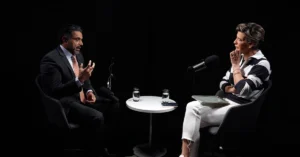▸ The Abu Dhabi Judicial Department (ADJD) on 10 Feb 2019, acknowledged Hindi language as its third official language after Arabic and English.
As a person who worked in the UAE and has extensive relationships and attachment to that nation, I am indeed delighted to see Hindi used as a third Court language in Judiciary. I wholeheartedly welcome the Government’s decision.
So far, only Arabic and English were used as court languages and all other languages were simply translated into paper for the benefit for the plaintiff or defendant upon request (for which additional translation fees was required to be paid).
This definitely helps many workers of lower strata. Most of the workers (the typical blue-collar workers) are now mostly from North, East and Central India apart from Pakistan, Afghanistan, Nepal and Bangladesh. Out of which Bangladesh workers of these grades are now facing a visa ban (applicable only for new recruitments) as part of UAE’s strategy of avoiding people of one nation to over-dominate.
These segment of workers say construction labourers, cleaners, sweepers, utility workers etc are mostly illiterate. As a former HR officer who worked in a major utility company that had more than two thousand workers, I personally understand the hardships that they face when it comes to the legal area. Most of them don’t know how to read or write in their own language, forget about English or Arabic. Most of the lower strata Pakistanis (Pathans) and Afghans workers, still use their fingerprints as they can’t sign while Bangladeshi workers often change their signature due to their lack of knowledge to write their own name. While a section of Pathans was able to pick up Arabic to some extent due to their linguistic similarity, the worst were always workers from Bangladesh, India and Nepal who can’t understand Arabic and of course English. This often results in the exploitation of them.
Whenever there is a case related to salary issue or other contract problems, they need to depend on middlemen who seriously exploit them with higher fees etc. Even to depend on the services of legally allotted translators at the court, they all charge hefty fee for any translation.
In the majority of the civil courts of UAE, it’s very common for a petitioner to speak with judges directly unlike the Indian system where we need lawyers. Even if we don’t know law points, we can highlight our problems directly to the judge. The role of the Judge isn’t typically like our system. He plays the role of an inquisitor as UAE Civil Court proceedings is that of the Inquisitorial system. But when these people don’t know both Arabic and English, they had to depend on expensive lawyers or judicial assistants (mostly Indians who work as legal assistants/officers). Though Indian Embassy has started a Workers Resource Center so as to provide subsidized or free legal support to financially constrained workers who have civil cases, often its time consuming and never much of great support.
I have encountered a case where one of our employee who was from Punjab had to pay around AED2,000 for services of the legal assistant in the court for getting his salary dues from the previous company worth AED5,000. He almost lost half of his hard-earned money in that process, just because he can’t speak to the judge and present his side of the story.
So if the court now allows Hindi as a court language, it allows these workers to directly speak to the judge and present their cases. They won’t be exploited much by others.
So in a way, this move by the government of Abu Dhabi is really appreciatable!
I have seena number of online forums claiming this as a diplomatic victory of the Indian government. Well, the reality is, UAE is a multi-lingual country and for a long time, it has been a policy of UAE to make its residents access government services in their language.
Most of the government departments in the UAE do have services of translators (even if its paid) and many government departments often present a bouquet of languages to the residents.
For example, if you call Etisalat/Du (telecom companies), the first option is fixing the language and they offer a choice of English, Arabic, Malayalam, Hindi/Urdu, Bengali and Tagalog.
So as the RTA, Dubai offers a driving test in more than 192 languages considering Dubai as a global city. Similarly, the Dubai and Abu Dhabi police offer services in multiple languages, so as the health departments across various emirates.
The court language was a bit problematic, as unlike the customer services of the government where you can hire any resident, this department can hire only the citizens of the UAE as judges. It’s not possible for the Judicial Department to hire a Malayalee or Punjabi as a judge. So the only option until recently was having a translator at the court.
It’s good to see that UAE now allows Hindi as a court language as many Arabs can understand the Hindustani language to a bit (Persianized Hindi). The influence of Bollywood also plays a factor apart from historical connections of many Arabs. So with a small linguistic training, they could brush up their language skills and able to directly hear the problems of petitioners/defendants.
The decision as such doesn’t make all Indians have an advantage as the majority of the Indian community in the UAE is from Kerala followed by Tamil Nadu, both having no understanding of Hindi. For both of these communities, Hindi is useless as we can only speak flawed Hindi, nor we read or write it. Most of Malayalees do speak elementary Hindi to communicate with people from Bengal/Bangladesh or Pakistanis or Afghans etc, which includes me too. But none of us can read or write Hindi as such.
I see no much issue, as the majority from South India has a basic understanding of English. Generally, a majority from South have passed their 10th or 12th grade at least, due to which they have a better understanding and ability to read and write English.
A really good decision. Definitely, UAE often takes public services seriously.
ⓘ This opinionated article was originally published as an answer to a question on Quora. The opinions expressed by the author are his own.
![[Opinion] Hindi Becomes the Third Official Court Language in Abu Dhabi](https://laffaz.com/wp-content/uploads/2019/09/hindi-third-official-court-language-abu-dhabi.jpg)




